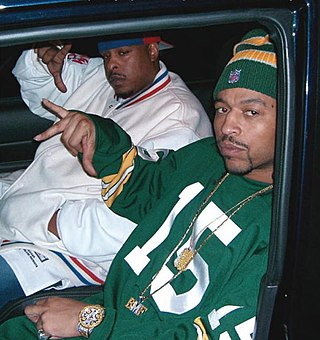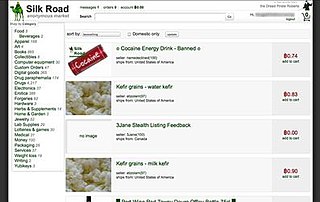
Money laundering is the process of illegally concealing the origin of money, obtained from illicit activities such as drug trafficking, corruption, embezzlement or gambling, by converting it into a legitimate source. It is a crime in many jurisdictions with varying definitions. It is usually a key operation of organized crime.

William Leonard Pickard is one of two people convicted in the largest lysergic acid diethylamide (LSD) manufacturing case in history. In 2000, while moving their LSD laboratory across Kansas, Pickard and Clyde Apperson were pulled over while driving a Ryder rental truck and a follow car. The laboratory had been stored near a renovated Atlas-E missile silo near Wamego, Kansas. Gordon Todd Skinner, one of the men intimately involved in the case but not charged due to his cooperation, owned the property where the laboratory equipment was stored.
The NETA Association is the name of a gang that began in the Puerto Rico prison system and spread to the United States mainland. Although Puerto Rico has many small street gangs claiming its poorer neighborhoods, NETAS is by far the largest and most dominant, controlling the illegal drug trade in the island's prison system.

Tomás Jesús Yarrington Ruvalcaba is a Mexican politician affiliated with the Institutional Revolutionary Party. He held office as the Mayor of Matamoros from 1993 to 1995, and the Governor of Tamaulipas from 1999 to 2005. Yarrington sought nomination for the presidential elections for the PRI in 2005.

The Black Mafia Family (BMF) is a drug trafficking and money laundering organization in the United States.
Vicente Carrillo Fuentes, commonly referred to by his alias El Viceroy, is a Mexican convicted drug lord and former leader of the Juárez Cartel, a drug trafficking organization. The cartel is based in Chihuahua, one of the primary transportation routes for billions of dollars' worth of illegal drug shipments entering the United States from Mexico annually. He was one of Mexico's most-wanted drug lords until his capture in 2014.

Frank Larry Matthews, also known as Black Caesar, Mark IV and Pee Wee, was an American drug trafficker and crime boss who sold heroin and cocaine throughout the eastern United States from 1965 to 1972. He operated in 21 states and supplied drug dealers throughout every region of the country. The Drug Enforcement Administration (DEA) ranks Matthews as one of the top ten drug traffickers in U.S. history and he is estimated to have had US$20 million in savings.

Silk Road was an online black market and the first modern darknet market. It was launched in 2011 by its American founder Ross Ulbricht under the pseudonym "Dread Pirate Roberts". He managed the entire marketplace from his personal laptop, which was seized by the FBI on 1 October 2013. As part of the dark web, Silk Road operated as a hidden service on the Tor network, allowing users to buy and sell products and services between each other anonymously. All transactions were conducted with bitcoin, a cryptocurrency which aided in protecting user identities. The website was known for its illegal drug marketplace, among other illegal and legal product listings. Between February 2011 and July 2013, the site facilitated sales amounting to 9,519,664 Bitcoins.
The dark web is the World Wide Web content that exists on darknets: overlay networks that use the Internet but require specific software, configurations, or authorization to access. Through the dark web, private computer networks can communicate and conduct business anonymously without divulging identifying information, such as a user's location. The dark web forms a small part of the deep web, the part of the web not indexed by web search engines, although sometimes the term deep web is mistakenly used to refer specifically to the dark web.

Sheep Marketplace was an anonymous marketplace set up as a Tor hidden service. It launched in March 2013 and was one of the lesser known sites to gain popularity with the well publicized closure of the Silk Road marketplace later that year. It ceased operation in December 2013, when it announced it was shutting down after a vendor stole $6 million worth of users' bitcoins.

Ross William Ulbricht is an American serving life imprisonment for creating and operating the darknet market website Silk Road from 2011 until his arrest in 2013. The site operated as a hidden service on the Tor network and facilitated the sale of narcotics and other illegal products and services. Ulbricht ran the site under the pseudonym "Dread Pirate Roberts", after the fictional character from The Princess Bride.

Operation Onymous was an international law enforcement operation targeting darknet markets and other hidden services operating on the Tor network.

Evolution was a darknet market operating on the Tor network. The site was founded by an individual known as 'Verto' who also founded the now defunct Tor Carding Forum. Evolution was active between 14 January 2014 and mid March 2015.

AlphaBay was a darknet market operating at different times between September 2014 and February 2023. Both as an onion service on the Tor network and as an I2P node on I2P. After it was shut down in July 2017 following law enforcement action in the United States, Canada, and Thailand as part of Operation Bayonet, it was relaunched in August 2021 by the self-described co-founder and security administrator DeSnake. The alleged original founder, Alexandre Cazes, a Canadian citizen born on 19 October 1991, was found dead in his cell in Thailand several days after his arrest, with police suspecting suicide.
A darknet market is a commercial website on the dark web that operates via darknets such as Tor and I2P. They function primarily as black markets, selling or brokering transactions involving drugs, cyber-arms, weapons, counterfeit currency, stolen credit card details, forged documents, unlicensed pharmaceuticals, steroids, and other illicit goods as well as the sale of legal products. In December 2014, a study by Gareth Owen from the University of Portsmouth suggested the second most popular sites on Tor were darknet markets.

Utopia was a darknet market similar to The Silk Road that facilitated sale of illegal items such as narcotics, firearms, stolen bank account information and forged identity documents. Utopia was based on Black Market Reloaded and has ties to it.
DeepDotWeb was a news site dedicated to events in and surrounding the dark web featuring interviews and reviews about darknet markets, Tor hidden services, privacy, bitcoin, and related news. The website was seized on May 7, 2019, during an investigation into the owners' affiliate marketing model, in which they received money for posting links to certain darknet markets, and for which they were charged with conspiracy to commit money laundering. In March 2021 site administrator Tal Prihar pleaded guilty to his charge of conspiracy to commit money laundering.
Grams is a discontinued search engine for Tor based darknet markets launched in April 2014, and closed in December 2017. The service allowed users to search multiple darknet markets for products like drugs and guns from a simple search interface, and also provided the capability for its users to hide their transactions through its bitcoin tumbler Helix.

Carding is a term describing the trafficking and unauthorized use of credit cards. The stolen credit cards or credit card numbers are then used to buy prepaid gift cards to cover up the tracks. Activities also encompass exploitation of personal data, and money laundering techniques. Modern carding sites have been described as full-service commercial entities.
United States v. Stumbo, was a Federal Court case in the Eastern District of California in which the 23 year old defendant, Tyler Stumbo, was convicted of conspiracy to distribute anabolic steroids, which were at the time a Class III prohibited substance. This was a violation of Title 21 sections 841(a)(1), 841(b)(1)(D) and 846, and carried a minimum penalty of 10 years in prison and a maximum penalty of Life in prison as well as a maximum fine of $250,000. The charges were filed by the DEA.













